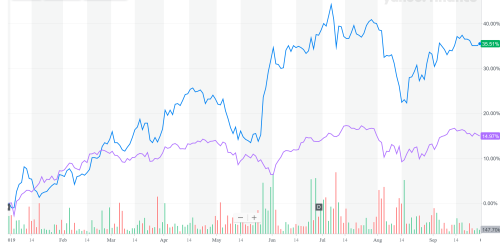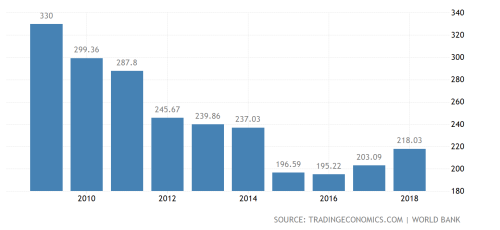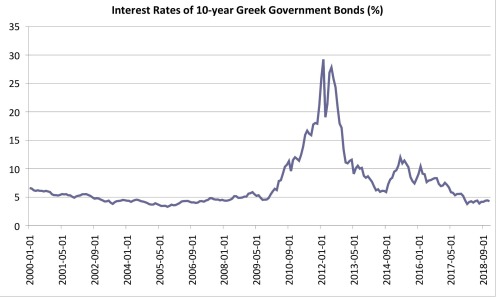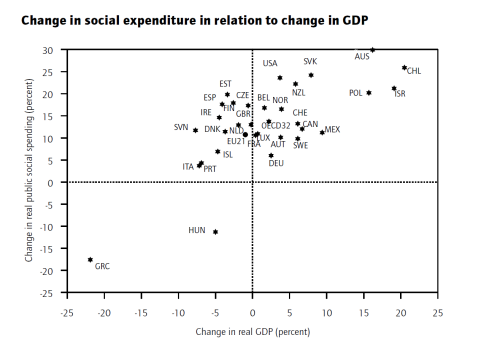Having just returned from a week in Greece, I may well have taken a few years off my life. If you have spent time on some of the Greek islands, you certainly know what I mean. And what a time to have been there, on the heels of a dramatic transition in political power (July 2019) and a resurgent economic environment, there was a sense of optimism that one would not have expected for a country emerging from a crushing economic crisis over the past dozen years.
Analysts assessed the situation in Greece a decade ago as more dire than that of the U.S. during the Great Depression of 1929. Unemployment rates spiked to over 28% from 9.7% in 2009; it now stands at 17%. Promises of meaningful structural reform by incoming Prime Minister Mitsotakis of The New Democracy party were enthusiastically received by global investors this summer, as he ushered out the far left Syriza political party and years of political turmoil. Year-to-date, the MSCI Greek ETF index far outperformed the U.S. Dow Jones index 35.5% to 15.0%, respectively.

This is likely to be the best year in the Greek equity markets in 20 years and the Greeks seem to be enjoying it given what we witnessed of the night life in Mykonos and Santorini (of course, maybe it is always like that). The Athens Index price/earnings ratio spiked from 10.4x at the end of 2018 to 14.1x now. The current European Union GDP growth forecast for Greece in 2019 is 2.9%, remarkable given that GDP collapsed by 45% from 2008 to 2016 as the country suffered through multiple austerity plans.

This was considered the greatest economic collapse for any country during peacetime. Three out of every ten companies failed this past decade according to the Greek Center of Planning and Economic Research. The level of public debt in 2018 was 183% of GDP and according to International Monetary Fund forecasts, will only be down to 135% by 2028. Currently, with $218 billion in GDP ($20.5k per capita), Greece only ranks #51 in size of economy. The ability to raise capital in the midst of the crisis became prohibitively expensive and restrictive.

In the midst of all of this economic carnage was the historic refugee crisis, with hundreds of thousands of people literally washing up on the shores of the Greek islands. According to the International Rescue Committee, Greece today hosts approximately 50k refugees, this in a country with only 11 million residents. Unfortunately, there has been a recent spike in arrivals, at rates greater than at any time over the last three years when the European Union severely restricted inflows.
The hand that PM Mitsotakis was dealt was quite problematic. Greece ranks as the second lowest in overall competitiveness in the European Union. Of the 140 countries ranked by the World Economic Forum, Greece was #44 in something called “innovation capability,” #72 in business dynamism, and #129 in access to venture capital. In fact, according to the Found.ation Accelerator in Athens, there was a mere 117 million euros in venture capital investments in 2018 with three companies accounting for nearly 70% of that.
Of particular interest, as a healthcare investor, was to better understand the impact of this period of severe economic distress on the general health of the Greek population. With an increasing understanding on the role of social determinants of health, what would be the impact when the entire system is completely overwhelmed.
The Greek National Health System, established in 1983, has been fraught with numerous inefficiencies from an overly centralized decision-making framework, to poor resource allocation models, and inadequate investments in healthcare technologies. Notwithstanding that average life expectancy now stands at 80.9 years, the current healthcare system is not considered at all patient-centric and inadequately responsive to current demands. Of note, Greece ranks #31 in life expectancy of the 228 ranked countries; as point of comparison, Monaco tops the chart at 89.3 years while Namibia ranks devastatingly last at 50.9 years. Years from now, it will be quite informative to see the impact of the economic crisis on longevity trends.
As part of the bailout terms set by European Central Bank and International Monetary Fund, Greece had to open historically protected economic sectors, implement austerity steps, address systemic corruption, and dramatically reduce public expenditures, notably those on public health services. According to the World Health Organization in 2014, public healthcare spending was 13.2% of overall government expenditures in 2006 which dropped to 11.5% in 2012, which was nowhere close to the established target of 6.0% by the terms of the bailout (equivalent to 9.0% of GDP). Just the level of pharmaceutical spend declined by more than 32% between 2006 and 2012. The chart below highlights how much of an outlier Greece was during this period for social expenditures.

An analysis conducted by the German Institute for Economic Research, which isolated on the period of 2008 – 2015, concluded that there was a staggering 10 point decline in the Visual Analogue Scale (86.1 to 76.7) when assessing overall healthcare status of the Greek population. During that period, healthcare expenditures dropped by 41%, wages declined by 35-45%, and in 2014 alone, 36% of the population was deemed “at risk of poverty.”
The Lancet recently published a comprehensive research study which concluded that for every 1.0% increase in unemployment rates, there was a corresponding 0.8% increase in suicides and an equal 0.8% increase in alcoholism. The European Observatory on Health Systems and Policies in 2014 released a study that saw a 45% increase in suicides during 2007-2011 (most pronounced among working men). There was a 19% increase in low birth weight babies and an increase of 43% in infant mortality during 2008-2010. Ironically, there was a 24% decline in the number of car accidents given the dramatic decline in economic activity during that same period.
While further longitudinal study is necessary, it is unambiguously clear that severe economic stress has devastating implications on population health. Greece witnessed significant rotation from the private healthcare system, which for many became immediately unaffordable, to an overwhelmed and inadequate public healthcare “safety net” system. The healthcare journal Hippokratia in 2014 highlighted the substitution of quality food for cheap energy foods which led to a spike in diabetes, obesity and hypertension (although confoundingly, Hellastat reported that pizza consumption dropped 30% that year). Three other meaningful contributors to overall decline in health conditions included a drop in medication adherence, increase in chronic stress, and decline in monitoring and follow-up.
For many populations and geographies, what was experienced by the Greeks during their devastating economic crisis, is their everyday reality. The promise of robust healthcare technology solutions may assist some of these people confronting such conditions, but when the overall healthcare system is so severely compromised, the problems become nearly intractable with far-reaching and damaging implications.

Michael,
I literally just arrived back from 8 days in Greece and this was a timely and well written read. So ironic given the tremendous medical, prevention and healing innovation in ancient Greece. I’m curious about your take on some other trends/themes: 1) potential rise/expansion of private payor system for wealthier Greeks creating haves/have nots. 2) future potential impact of widespread smoking and vaping on the already constrained system and 3) innovation aside, does Greece have the talent pipeline to provide basic general health care. I know the contexts are different but I was struck, in a visit to Ethiopia early this year, by the high impact with low tech on many of the outcomes areas you referenced.
Thanks for writing these Michael. I really appreciate them. Trust all else is well with you and family.
Best,
Kelly
great to hear from you. and those are clearly going to be issues – a real bifurcated system which ultimately exacerbates the issues. am always surprised at the level of poor behavior like smoking/vaping which i attribute in part to poor public health education programs (which are going up against billion dollar ad budgets of cpg companies).
Great Article Michael. My fiancee is Greek though she has been here for 20 years. Add to this, Chernobyl. High incidence of various forms of cancer due to this,
Chip
appreciate the note!!
Thanks Michael for sharing this yet another thoughtful and insightful POV!!! Always a pleasure reading…
What opportunities Greece has in the global Digital Health entrepreneurship scene?
What Greece can and should do to leverage its EU position in order to enter the Digital Health arena?
thanks Ron. All good questions – not sure what the best entry point is to build a big HIT company until you sort out the overall framework that needs to be more patient-centric, able to be risk bearing. Maybe you have better ideas?!?
Totally agree Michael that patient-centricity is a must.
My thinking is that, within this framework, a consumer play has a greater potential than HIT enterprise play (whether provider, payer, or pharma) — a/m/b Time-To-Market and Return-on-Adoption.
As to Greece potentially entering the global Digital Health innovation arena, the following comes to mind:
1. Digital Health innovation is a geo-political agnostic thing, notwithstanding certain Go-To-Market restrictions apply (such as GDPR and HIPAA, among others). Therefore, conceivably Greece may have a fair shot here.
2. The talent that Digital Health companies need is location-unbound while legacy innovation clusters are increasingly expensive. Therefore, Greece may have a fair shot at supplying local talent and attracting others to join in.
3. As “[t]his is likely to be the best year in the Greek equity markets in 20 years”, Massachusetts may have an opportunity worth exploring to participate in establishing a Digital Health entrepreneurship cluster in, and for Greece.
Thoughts?…
Thank you for including me Michael. Seems to me the digital health opportunity would be best informed by understanding what health determinants had the first and most impact on population health decline during the economic decline and devastation and what is improving versus what is persisting as the economy begins to recover. I also suspect if you could learn about access to behavioral health care services and willingness to access behavioral health care services during decline, nadir, and economic recovery you’d know how to better design and deploy digital health to accelerate recovery. Knowing that you can’t normalize for culture, I still believe there are lessons to be learned from the Greek experience and it would be a great innovation learning laboratory as well as a public policy laboratory for other populations.
great set of insights, Dr. Loy – as always.